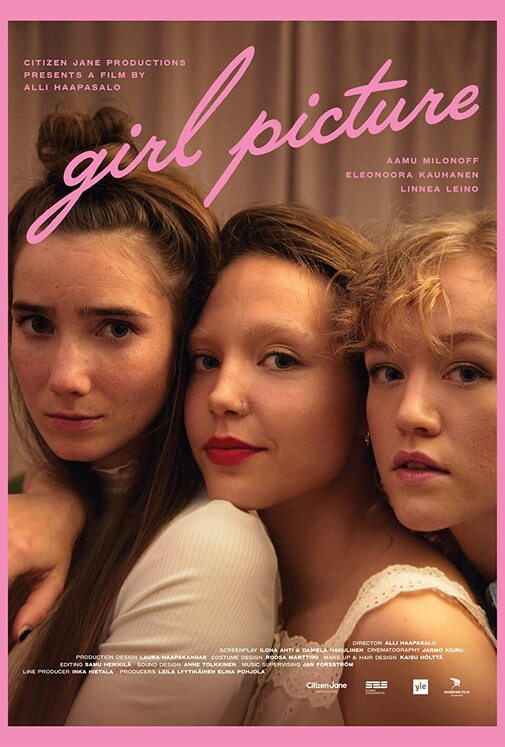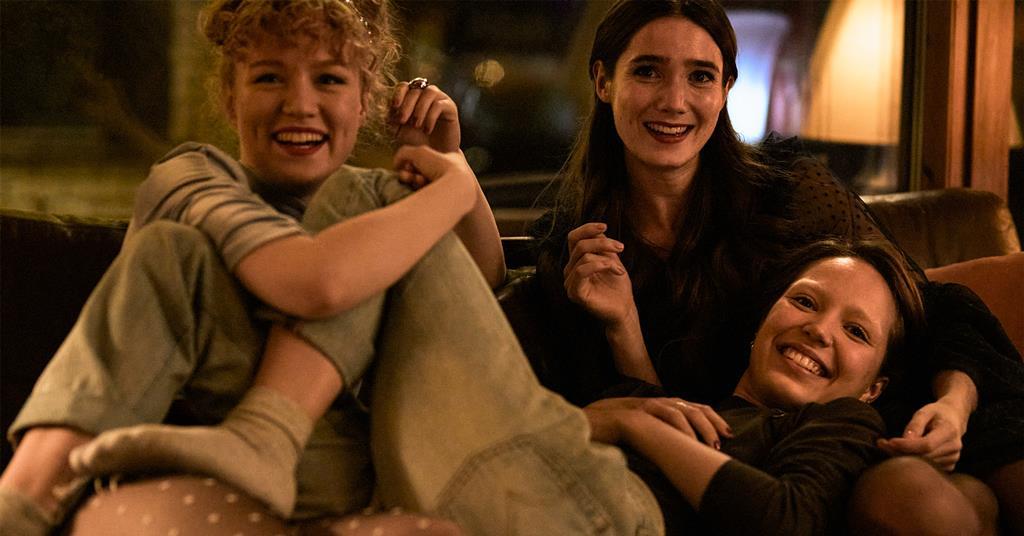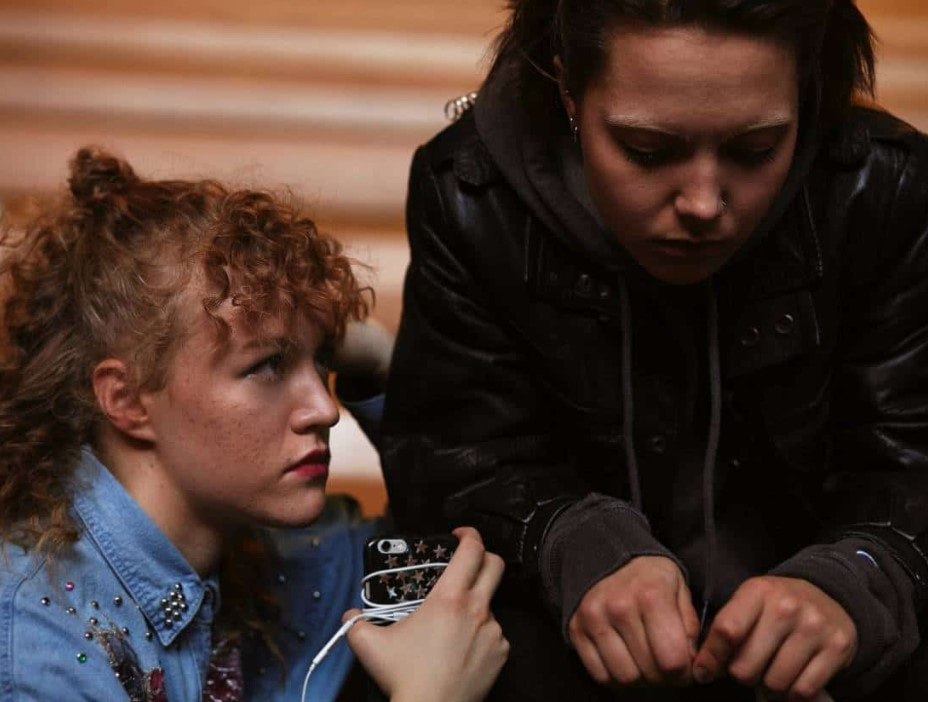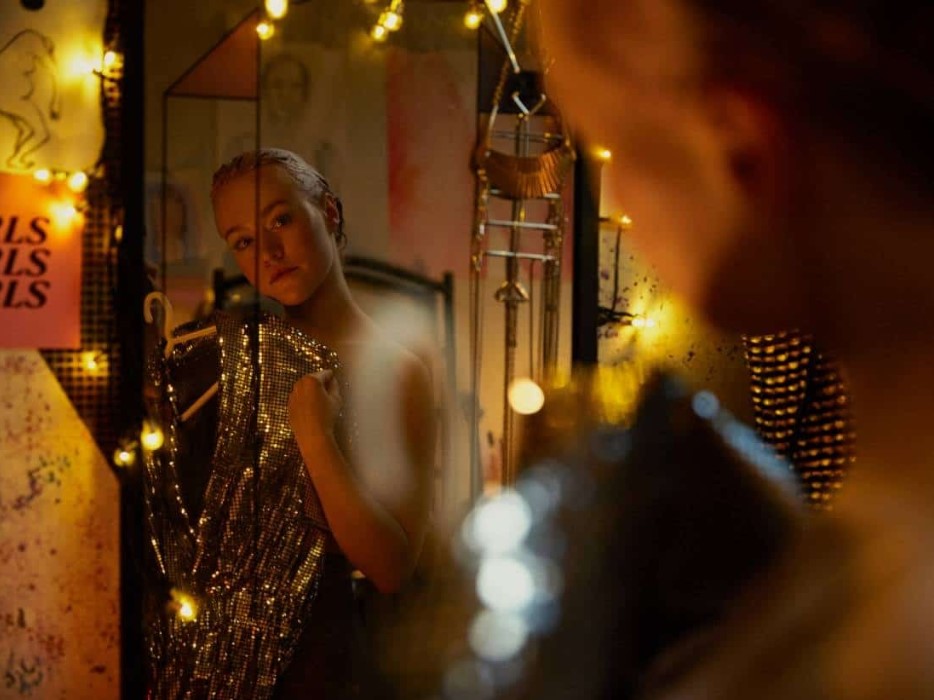“A true and tender portrait of female adolescence… an affecting achievement that never feels less than loving.”
–Natalia Winkelman, IndieWire
“I can never get enough films about female friendship and “Girl Picture” is a top-notch entry into this subgenre.”
–Marya E. Gates, RogerEbert.com
–Natalia Winkelman, IndieWire
“I can never get enough films about female friendship and “Girl Picture” is a top-notch entry into this subgenre.”
–Marya E. Gates, RogerEbert.com

Robert Abele | Los Angeles Times
With all the flushed-cheeks goings-on in the Finnish film “Girl Picture” — a fleet, charged portrait of three adolescent females navigating flights of passion — you could front-load a week’s worth of message-heavy after-school specials.
But thankfully, we’re in the hands of a sensitive, nonjudgmental filmmaker in Alli Haapasalo, who’d rather spark our empathy observing almost-womanhood’s joys and sorrows than be one more moralist with raised eyebrows and ready lessons. In fact, the actual title, more accurately translated into English as “Girls Girls Girls,” better reflects the celebratory aims of Haapasalo’s third feature, reclaiming as it does a phrase typically used to admonish young women in Finland.
The Times is committed to reviewing theatrical film releases during the COVID-19 pandemic. Because moviegoing carries risks during this time, we remind readers to follow health and safety guidelines as outlined by the CDC and local health officials.
What she has keenly fashioned from a screenplay by Ilona Ahti and Daniela Hakulinen is an embracing, naturalistic triumph about the insights that come with expectations and desire at so tender, idealistic an age, when a moment can feel like an eternity (for good or bad) and every decision possibly the threshold of all that the future holds. Until, that is, tomorrow promises another chance to feel normal, thwarted or excited all over again.
Tart-tongued cynic Mimmi (Aamu Milonoff) and her sweet-faced bestie, Rönkkö (Eleonoora Kauhanen), are co-employees at a mall smoothie stand selling drinks with ridiculous names like Just Breathe and It Takes Two to Mango. They’re merry outsiders with a tight bond, supporting each other’s neuroses about passion: intellectual Mimmi sees herself as above such concerns, while Ronkko — a romantic who’s no stranger to fumbling sex with boys — fears she can’t experience pleasure.
A clique away in their high school orbit of suburban parties, mall hangs and clubbing is Emma (Linnea Leino), a figure skating prodigy suffering a sudden, worrisome lack of focus, her dream possibly endangered because a Europe-wide competition is around the corner and suddenly, she can’t execute a triple Lutz.
When Mimmi and Emma lock eyes one day at the smoothie counter, there’s an awkward exchange tinged with hostility — the former’s armor of condescension crossing the latter’s open book vulnerability. But there’s an undeniable spark, and a momentous night ensues that reveals a whole new world of feelings, security and identity for both.
Witnessing the change in Mimmi — once baldly dismissive of sports, now head over heels for a training athlete — Rönkkö is spurred to find her own ecstasy and tackle the world of flirting and hookups with an eye toward the sensation she craves, rather than the gratification boys always seem to get. For Emma, meanwhile, the blush of first love is like a wonder drug attacking the pressures of the rink, and it might mean even more.
There are obstacles and setbacks in each girl’s quest, of course, but unlike how we’ve been primed since forever from teen dramas to expect a severe adult, cruel peer or societal rule to take that hindering form, Mimmi, Emma and Rönkkö are refreshingly both their own worst enemies and, in the context of a world that lets them be who they are, their only way forward. In other words, they’re gloriously human, and in this trio of vividly turned performances — especially Leino’s and Milonoff’s, whose eyes and postures convey so much — we feel each start and stop, every rush and ache.
Haapasalo finds the right balance between warmth and anxiety in using a boxy frame — sometimes tight, sometimes tall — for Jarmo Kiuru’s textured cinematography. She uses pop music and nondiegetic scoring confidently too to slide us into her protagonists’ moods or switch scenes to jarring effect.
“Girl Picture” is designed to feel as closely observed as a diary, but it’s also like being pulled along by a friend eager for you to experience what they go through, see things the way they do, to just get it and have a great time too. That’s a special kind of invitation, and “Girl Picture” is more than enough movie to make its compassion for the lives of teenage girls a swirling, swooning high.
With all the flushed-cheeks goings-on in the Finnish film “Girl Picture” — a fleet, charged portrait of three adolescent females navigating flights of passion — you could front-load a week’s worth of message-heavy after-school specials.
But thankfully, we’re in the hands of a sensitive, nonjudgmental filmmaker in Alli Haapasalo, who’d rather spark our empathy observing almost-womanhood’s joys and sorrows than be one more moralist with raised eyebrows and ready lessons. In fact, the actual title, more accurately translated into English as “Girls Girls Girls,” better reflects the celebratory aims of Haapasalo’s third feature, reclaiming as it does a phrase typically used to admonish young women in Finland.
The Times is committed to reviewing theatrical film releases during the COVID-19 pandemic. Because moviegoing carries risks during this time, we remind readers to follow health and safety guidelines as outlined by the CDC and local health officials.
What she has keenly fashioned from a screenplay by Ilona Ahti and Daniela Hakulinen is an embracing, naturalistic triumph about the insights that come with expectations and desire at so tender, idealistic an age, when a moment can feel like an eternity (for good or bad) and every decision possibly the threshold of all that the future holds. Until, that is, tomorrow promises another chance to feel normal, thwarted or excited all over again.
Tart-tongued cynic Mimmi (Aamu Milonoff) and her sweet-faced bestie, Rönkkö (Eleonoora Kauhanen), are co-employees at a mall smoothie stand selling drinks with ridiculous names like Just Breathe and It Takes Two to Mango. They’re merry outsiders with a tight bond, supporting each other’s neuroses about passion: intellectual Mimmi sees herself as above such concerns, while Ronkko — a romantic who’s no stranger to fumbling sex with boys — fears she can’t experience pleasure.
A clique away in their high school orbit of suburban parties, mall hangs and clubbing is Emma (Linnea Leino), a figure skating prodigy suffering a sudden, worrisome lack of focus, her dream possibly endangered because a Europe-wide competition is around the corner and suddenly, she can’t execute a triple Lutz.
When Mimmi and Emma lock eyes one day at the smoothie counter, there’s an awkward exchange tinged with hostility — the former’s armor of condescension crossing the latter’s open book vulnerability. But there’s an undeniable spark, and a momentous night ensues that reveals a whole new world of feelings, security and identity for both.
Witnessing the change in Mimmi — once baldly dismissive of sports, now head over heels for a training athlete — Rönkkö is spurred to find her own ecstasy and tackle the world of flirting and hookups with an eye toward the sensation she craves, rather than the gratification boys always seem to get. For Emma, meanwhile, the blush of first love is like a wonder drug attacking the pressures of the rink, and it might mean even more.
There are obstacles and setbacks in each girl’s quest, of course, but unlike how we’ve been primed since forever from teen dramas to expect a severe adult, cruel peer or societal rule to take that hindering form, Mimmi, Emma and Rönkkö are refreshingly both their own worst enemies and, in the context of a world that lets them be who they are, their only way forward. In other words, they’re gloriously human, and in this trio of vividly turned performances — especially Leino’s and Milonoff’s, whose eyes and postures convey so much — we feel each start and stop, every rush and ache.
Haapasalo finds the right balance between warmth and anxiety in using a boxy frame — sometimes tight, sometimes tall — for Jarmo Kiuru’s textured cinematography. She uses pop music and nondiegetic scoring confidently too to slide us into her protagonists’ moods or switch scenes to jarring effect.
“Girl Picture” is designed to feel as closely observed as a diary, but it’s also like being pulled along by a friend eager for you to experience what they go through, see things the way they do, to just get it and have a great time too. That’s a special kind of invitation, and “Girl Picture” is more than enough movie to make its compassion for the lives of teenage girls a swirling, swooning high.
DISCUSSION FOLLOWS EVERY FILM!
$7.00 Members | $11.00 Non-Members
TIVOLI THEATRE
5021 Highland Avenue | Downers Grove, IL
630-968-0219 | classiccinemas.com
We apologize—Movie Pass cannot be used for AHFS programs
$7.00 Members | $11.00 Non-Members
TIVOLI THEATRE
5021 Highland Avenue | Downers Grove, IL
630-968-0219 | classiccinemas.com
We apologize—Movie Pass cannot be used for AHFS programs









